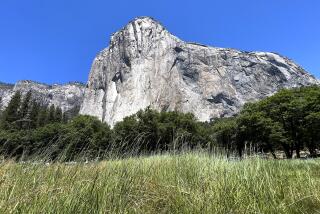Bush Lets Snowmobile Ban Stand Pending Study
- Share via
The Bush administration has allowed a rule banning recreational snowmobiles in Yellowstone National Park to stand for now, while administration lawyers work on a compromise that could lead to some snowmobile use.
The Department of Interior said Monday that it would not stand in the way of the prohibition, put in place by the Clinton administration, that would outlaw snowmobiles in Yellowstone and Grand Teton national parks by the winter of 2003-04.
At the same time, attorneys for the department are in settlement talks with snowmobile enthusiasts, manufacturers and others who have sued, challenging the ban.
Interior Department spokeswoman Stephanie Hanna said Monday, “It is Secretary [Gale] Norton’s desire that we open the doors again and take more information that will lead to a better solution.”
White House spokesman Scott McClellan added: “The administration is continuing to work with all interested parties, particularly state and local communities, and we believe we can reach an agreement that will allow for limited recreational use while ensuring that we protect our national parks.”
That could mean limited snowmobile use, he said.
One of the ban’s most vocal supporters is Yellowstone Park’s outgoing superintendent, Michael Finley, who is resigning from the National Park Service in May.
“We believe strongly we have a duty to protect Yellowstone on behalf of the American public,” said Finley, who insisted that his departure has nothing to do with the snowmobile issue. “We made what we believe is the best scientific decision, and in the best interest of future generations.”
In a letter to the Park Service last October, the U.S. Environmental Protection Agency, which supported the ban, said a review found that snowmobiles caused “ongoing significant environmental and human health impacts.”
The park’s chief spokeswoman, Marsha Karle, on Monday said the ban was imposed after years of study allowing thousands of people and groups to make their views known.
“We’ve been looking at this for more than 10 years,” Karle said. Park officials distributed about 4,000 copies and summaries of a draft environmental review in 1999 and received more than 48,600 pieces of correspondence in response, Karle said. At least 22 public meetings were held, she said.
Snowmobile aficionados, however, have labeled the ban an overreaction. They maintain that snowmobiles can coexist with wildlife, perhaps with some restrictions and development of cleaner, quieter snowmobile models.
The possibility that the ban will be revisited was applauded Monday by the Blueribbon Coalition, an Idaho-based group backing motorized recreation on public lands.
“It’ll be better for everyone to open the process and consider the broad range of information that was not considered previously,” said Adena Cook, the coalition’s public lands director.
Some environmentalists had expected the administration to block the restrictions, which began taking effect Sunday.
But Cook said that would have been impractical, adding that she instead supports a process called a supplemental environmental review that would allow additonal comment.
“We’re reasonably optimistic that we can get this done in the near term,” said William P. Horn, the attorney who represents the Blueribbon Coalition, the International Snowmobile Manufacturers Assn. and others in the suit challenging the ban. He criticized the Clinton administration for opting for a ban during the earlier review process, calling it “an egregious political outrage.”
He added that his clients would support “a fair process, and a process that reflects facts and science and not a lot of political chicanery.”
Yellowstone has become the country’s best-known symbol of the controversy over motorized recreational use in national parks, with an estimated 1,300 snowmobiles a day cruising its snowy slopes.
Finley spoke of untrained snowmobilers driving 80 mph on roads limited to 45 mph. He described a scenario called “bison pingpong,” in which groups of snowmobiles push bison down a road a few hundred yards, and the animals are then herded back by snowmobiles moving in the other direction.
Environmental groups also criticized the settlement talks.
“It’s fair to ask, if we can’t protect Yellowstone, what can we protect?” Jon Catton, spokesman for the Greater Yellowstone Coalition, a conservation group, said.
The ban, approved by parks officials in December, would be implemented in phases, with snowmobiles reduced by 50% in the winter of 2002-03 and banned entirely a year later. So-called “snow coaches” carrying eight to 10 people in heated cabins would still be allowed.
More to Read
Sign up for Essential California
The most important California stories and recommendations in your inbox every morning.
You may occasionally receive promotional content from the Los Angeles Times.













